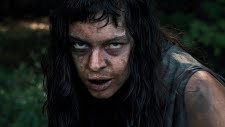
Pollyanna as The Woman
Statuesque Scottish actress Pollyanna McIntosh is taking critics and crowds by storm with her ferocious performance as the title character of Lucky McKee's new horror sensation The Woman. She plays a feral woman who's captured by a white-bread family and subjected to the father's disturbing idea of domestication. We spoke to the busy star just as the UK steels itself for the film's release.
David Graham: Hi there, thanks for taking the time to answer our questions. You've recently starred in successful thrillers (Exam) and comedies (Land Of The Lost/ Burke and Hare), but The Woman especially is going down a storm with critics and the horror crowd alike. Do you have an affinity or affection for the genre? What are your favourite horror films?
Pollyanna McIntosh: Thanks mate. I didn’t consider myself a horror fan before but having got to understand the genre further I recognise that I have always admired the more artfully made horrors such as Rosemary’s Baby and The Shining, particularly Rosemary’s Baby as I connected with Rosemary’s character very much. I think every woman understands how she felt at some point, brushed off as weak, hysterical or talked to quietly like a child. What an inventive way to build of fear and isolation - and Mia Farrow is impeccable in it.
Stylistically I love it too. I was 12 when I saw that and it blew me away. I saw The Omen by mistake when I was six. Wow! I haven’t seen it since but I can remember it almost scene by scene. Anything with Gregory Peck in it has my vote but the conflict of the parents’ feelings about their child was what really got me and scared me. I loved it. I guess those are both good examples of what “true” horrors are to me, a genre I feel The Woman fits into. Oh, and I just saw Battle Royale by Kinji Fukasaku and it has to go down as one of my favourite films in any genre. It’s absolutely nuts and totally brilliant.
DG: You have previous experience with Jack Ketchum, playing the same character as you do in The Woman for 2007 cannibal flick The Offspring. What do you think it is about his ultra-dark tales that captivates modern audiences?PM: Ketchum is a great storyteller who invests a lot in his characters, which allows his readers to. He’s been doing this a long time and as Steven King says, “he’s the scariest man in America!”
DG: Were you aware of Lucky McKee and his previous work (May, The Woods, Red) prior to this project?
PM: Like many people, I imagine, I was introduced to Lucky’s work by my local video store film geek. He said, “You must see May!” and I said, “Oh no, you know I don’t like horrors.” and he said, “You’ll like this one.” He had never been wrong before so I went for it. Of course he was right. Like many independent video stores, mine eventually closed down but I’m not worried about that guy. Last I heard he had saved up enough for the film course he wanted to do. I reckon we’ll hear from him soon enough!
DG: The director's female-centric sensibility seems to be one of the reasons the film works so well in terms of both upsetting and moving the audience. Would you have considered doing this film with anyone else at the helm? What other modern directors do you like?
PM: I’m only good at what ifs looking forward, not back, so I can’t say but I can answer your second question. Fave modern directors that come to mind are: Kathryn Bigelow, Matthew Vaughn, Brian McGuire, James Mangold, Miranda July, Patrice Leconte, John Cameron Mitchell, Pedro Almodóvar, James L Brooks and Gregg Araki.
DG: The Woman was always going to ruffle feathers, but no-one could have predicted the intensity of the physical and emotional reactions experienced at Sundance. How did that make you feel? Did you ever doubt any of the film's content as being justified when you were making it?
PM: At Sundance I was having my own physical and emotional reaction to the film so it was a lot to take, for me, when it all kicked off. I was at once afraid, angry, shocked and sick at the verbal diatribe that “Angry Dude” spewed, especially as Lucky was releasing his baby to the public for the first time and what was being levelled at him was utterly untrue and possibly his worst fear, to be misunderstood so negatively.
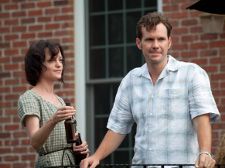
Lucky and I were both very aware of ensuring the film was not exploitative and I feel we achieved that. It’s odd to me that people get riled up about it but seem to be okay with films such as Hostel or Captivity. As you say, this film seems to ruffle. And that’s okay with me.
DG: Your character's vocal expression is one of the most fascinating and unsettling aspects of the film. How did you achieve this, did your travel experience as a child and exposure to different languages inform your take on The Woman's speech (Pollyanna was born in Scotland but lived in Portugal and Colombia before settling in London as a teen)? Were you free to experiment and improvise or was Lucky very specific about how she should sound?
PM: Thanks. I’ve mimicked all my life and yes, perhaps it’s an adaptation tool from moving around so much, though my father’s the same way. I’ve always enjoyed playing with my voice and there are elements in The Woman’s noises that come from a monster voice I did as a child. If you listen to big cats they sometimes make the rarest sounds that you don’t expect and they, as well as wolves, influenced me a lot. Feral kids I watched in documentaries were another influence. After my research I then found her voice amalgamated and came quite naturally by just letting rip with what came out of me once I got into my own “natural” state as the character. Lucky and I never discussed the exact noises she’d make, perhaps because he had some inkling from seeing me in Offspring. Ketchum describes her voice as being scratchy and almost hoarse so that’s where I first started.
DG: Many actors in extreme roles try to stay in character on-set - did you try or have to do this at all?
PM: Not really but there was a point, after much morning joking around, when I would get focussed, about two thirds into makeup and from that point on I’d allow myself to retreat into her, or rather unapologetically become more forceful, more physical and less concerned with others’ feelings. It was a pleasant experience and as long as I allowed myself that option I could flip in and out as I chose. I like to have fun on set and mealtimes are always very social for me so I would never stay in character all day. I don’t feel the need to.
DG: Did you and Sean Bridgers avoid each other off-camera to preserve the intensity between your characters in their confrontations? Or did you have to take it lightly and be comfortable around each other to get through it?
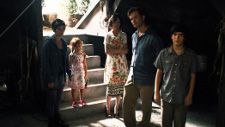
PM: I thought I’d avoid both Sean and Angela (Bettis) but I found that the three of us were sharing a house as soon as I arrived in Massachusetts. Angela and Sean are old mates so I was, just as in the story, the outsider, but we connected as coming from the same tribe very quickly. Funnily enough, Sean and I are both strong willed, slightly control freakish people who like to tell a story so there was a wee battle of wills that went on there as housemates and sharers of the “family” car, which lead to a stronger bond because we saw our weaknesses in each other and found it really funny. Soon enough it was a big ole love fest and we were all inseparable. They are such great actors and boldly go with their instincts that our chatty, goofy friendship that was building up and remains strong a year later could never interfere with how we all interacted in character. There was great trust and respect between us and that can only be good for your work too.
DG: How did you find working with Hollywood legend John Landis for Burke And Hare? Do you have any memorable stories about working in a period version of your hometown?
PM: I grew up on Landis’ comedies and he was no disappointment in being larger than life. John is an encyclopaedia of film history and anecdotes. I had always been, as most Scots are, oddly proud of my gruesome heritage so I was rather disappointed to learn that Burke and Hare were Irish. I wish I had a great story for you but I have a sweet one instead. Simon Pegg and Jessica Hynes (formerly Stevenson) started their careers off on Spaced and there was a wee moment where they were sitting in the green room of the oldest music hall in London taking in their fine rich costumes festooned with silk ribbons and velvet trim, their delicious catered lunch spread before them and the size of movie they were working on, and Simon said to Jessica, “Do you remember when we all shared that double decker bus for everything on Spaced?” It was a lovely moment and one that spoke to me of the kind of career I want, where you continue to work with those you love and respect, you make things happen for yourself and you never forget where you came from.
DG: You started on stage before moving to the screen. Would you like to be able to continue to do both or were you always aiming to make films?
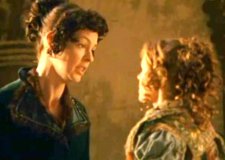
PM: I would love to do both. As an actor it has been hard to take enough time away with a play but as I gain a foothold in the business of film I should be able to bugger off and do theatre without worrying so much. That is my hope anyway.
DG: You have experience as a director too. What sort of cinematic projects would you like to direct?
PM: Oh I have five scripts I would like to get finished and direct. The stories I want to tell range from modern comedy to historical drama. My experience as a director has been in theatre so I’m all too aware I will need a great film course and some mentoring before I take the reins of a movie myself. I will do it though. Of that I’m sure.
DG: How was the experience of working on the Dante's Inferno videogame? Would you like to do some animation work too?
PM: That was fun. It’s sort of like doing mask work, so freeing and melodramatic. You look like a nutter in those motion capture suits too though you can’t help feeling perversely like a badass in your utterly technical stretchy gear. Sort of a cross between a Bauhaus display member and a studded belt. I’d love to do animation work, yes. Bring it on!
DG: What are you working on at the moment, and what should we look out for you starring in next?
PM: Right now I’m in Luxembourg filming Love Eternal by Brendan Muldowney (Savage). I play a rather depressed woman who cloaks her feelings in false hope. It’s a great character so I hope I’m doing her justice. After two projects shot in Scotland, Foxy and Marina and an episode of kid’s BBC show Dani’s House, this year has meant a trio of US indies. I expect the first one out will be The Obsession (an almost absurdist drama) with Dominique Swain, Richard Riehle and James Duval (he was Frank the bunny in Donnie Darko!) then Carlos Spills the Beans (comedy) directed by my friend Brian McGuire. Last I shot The Famous Joe Project where I play a cokey party girl who sells out a new friend only to discover what she truly wants.
DG: Thanks very much Pollyanna, hope you're enjoying all the well-deserved praise for your unforgettable performance! Let us know if you're ever in Glasgow and fancy a drink, you could come dressed as The Woman, you'd fit right in with the locals...
PM: Oh, I’d be thrown out of Glasgow in a skirt that long, would I not?!
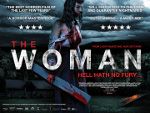 |





















